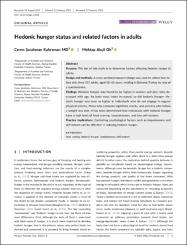| dc.contributor.author | Şarahman Kahraman, Ceren | |
| dc.contributor.author | Akçıl Ok, Mehtap | |
| dc.date.accessioned | 2022-09-12T10:39:18Z | |
| dc.date.available | 2022-09-12T10:39:18Z | |
| dc.date.issued | 2022 | en_US |
| dc.identifier.uri | https://hdl.handle.net/20.500.12868/1596 | |
| dc.description.abstract | Purpose The aim of this study is to determine factors affecting hedonic hunger in adults. Design and methods A cross-sectional research design was used to collect face-to-face data from 315 adults, aged 18-65 years, residing in Balikesir/Turkey by way of a questionnaire. Findings Hedonic hunger was found to be higher in women and also rates decreased with age. As body mass index increased, so did hedonic hunger. Hedonic hunger was seen as higher in individuals who do not engage in regular physical activity, those who consume nighttime snacks, and persons who follow a weight loss diet. It has been determined that individuals with hedonic hunger have a high level of food craving, impulsiveness, and low self-esteem. Practice implications Controlling psychological factors such as impulsiveness and self-esteem can be effective in reducing hedonic hunger. | en_US |
| dc.language.iso | eng | en_US |
| dc.relation.isversionof | 10.1111/ppc.13036 | en_US |
| dc.rights | info:eu-repo/semantics/closedAccess | en_US |
| dc.subject | Food craving | en_US |
| dc.subject | Hedonic hunger | en_US |
| dc.subject | Impulsiveness | en_US |
| dc.subject | Self-esteem | en_US |
| dc.title | Hedonic hunger status and related factors in adults | en_US |
| dc.type | article | en_US |
| dc.contributor.department | ALKÜ, Fakülteler, Sağlık Bilimleri Fakültesi, Beslenme ve Diyetetik Bölümü | en_US |
| dc.identifier.startpage | 1 | en_US |
| dc.identifier.endpage | 8 | en_US |
| dc.relation.journal | Perspectives in Psychiatric Care | en_US |
| dc.relation.publicationcategory | Makale - Uluslararası Hakemli Dergi - Kurum Öğretim Elemanı | en_US |


















